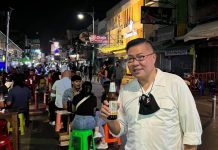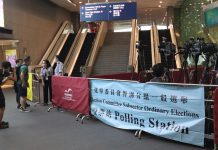When Tai Lok, a 23-year-old former student of the pro-Beijing Pui Kiu Middle School, formed a national education concern group for the school, he met with disapproval from the school’s official alumni association.
Tai, who is now studying government and political administration at the Chinese University of Hong Kong, was schooled in the Mainland until he moved to Hong Kong in his early teens. He describes his education as being very pro-establishment.
“It’s hard for secondary students to have their own points of view, they’re usually influenced by their environment. Pui Kiu influenced a lot of the students’ [mindsets],” he says.
Tai recalls the school often invited guest speakers with pro-establishment backgrounds to hold talks and discussions. “The most unforgettable one was Jasper Tsang Yok-sing,” says Tai. “He talked about the shortcomings of democracy. He tried to persuade us that democracy wasn’t always good, that not everyone had to have a vote. It was a big blow to me.”
Tai began to think differently when he was in Form Six and entered a writing competition about China’s 1911 revolution. By the time the national education controversy erupted, he had very different views from his school.
This prompted him to return to his alma mater with some other alumni to hand out leaflets and black ribbons at the school entrance to oppose the subject.
Both the school and the alumni association frowned on their action. The school suppressed the protest and, in a school assembly, told students their seniors had behaved badly.
Tai is not surprised. He says the alumni association is very close to the school management. Its events are not limited to alumni. Instead it helps the school to organise tours to the Legislative Council and holds seminars for current students. “Frankly speaking, our alumni association joins hands with the school at all times. It’s hard to be close to the centre of power in the alumni association unless you identify with the school’s beliefs,” he says.
The Maryknoll Fathers’ School (MFS) Alumni Concern Group also has strained relations with that school’s official alumni association. Matters came to a head when around 40 alumni, including four anti-national education activists, had their applications to join the alumni association rejected in October last year.
The association explained this was because the recruitment of new members had been suspended pending changes to the group’s constitution. But two of the affected concern group members, Linda Wong Shui-hung and Rock Li Cheuk-yin are unconvinced. They think the underlying reasons are political.
Wong, 36, says she did not join the alumni association when it was set up in 2005 because she was unsure of what she could contribute to the school at that point. Now she is established in her career as a barrister, she wants to give back to the school.
Wong lauds the past achievements of the alumni association, of which Secretary of Security Lai Tung-kwok is the honorary head, in raising funds for the school’s expansion. But she questions the association’s explanations and notes that unlike the alumni concern group, the alumni association is made up of former students who graduated a long time ago. “A healthy and representative alumni association should encompass voices from different generations,” says Wong.






































